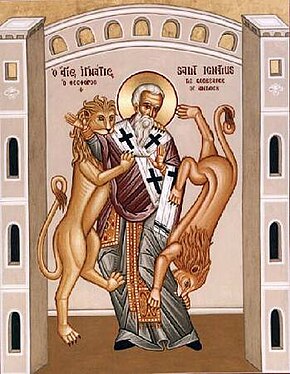
Back Cristianisme proto-ortodox Catalan Cristianismo proto-ortodoxo Spanish مسیحیت پروتو ارتدوکس Persian Christianisme proto-orthodoxe French Kekristenan proto-ortodoks ID Kristianisma prôtô-ôrtôdôksa Malagasy Proto-orthodox christendom Dutch Kristiyanismong proto-ortodokso Tagalog

The term proto-orthodox Christianity or proto-orthodoxy describes the early Christian movement that was the precursor of Christian orthodoxy. Older literature often referred to the group as "early Catholic" in the sense that their views were the closest to those of the more organized Catholic Church of the 4th and 5th centuries. The term "proto-orthodox" was coined by Bentley Layton (a scholar of Gnosticism and a Coptologist at Yale), but is often attributed to New Testament scholar Bart D. Ehrman, who has popularized the term by using it in books for a non-academic audience.[2] Ehrman argues that when this group became prominent by the end of the third century, it "stifled its opposition, it claimed that its views had always been the majority position and that its rivals were, and always had been, 'heretics', who willfully 'chose' to reject the 'true belief'."[3]
Early Christianity had many diverse sects and doctrines. Critics of the stance downplaying the proto-orthodox's prominence (such as Larry W. Hurtado) generally argue that the writings of the Catholic anti-heresiologists condemning others as heretics was still essentially accurate: that of all the Christian groups, the "proto-orthodox" has the most common ground with the immediate followers of Jesus in the Apostolic Age and Christianity in the 1st century, and were indeed the most common variety of Christianity even then.
- ^ O'Connor 1913.
- ^ Layton, Bentley (August 1, 1995). The Gnostic Scriptures: A New Translation with Annotations and Introductions. New York: Doubleday. p. 166. ISBN 978-0300140132.
- ^ Ehrman 2015, p. 7.
© MMXXIII Rich X Search. We shall prevail. All rights reserved. Rich X Search